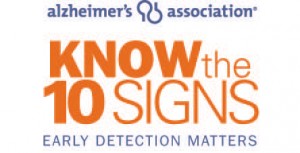
Have you ever forgotten your coffee cup was on the top of your car and driven off? Spaced out on a friend’s birthday? Lost your train of thought mid-conversation? For many of us, these are simply consequences of the hectic lives we lead. For others, they may be signs of something more serious, like Alzheimer’s.
Most everyone knows someone affected by Alzheimer’s disease, the most common form of dementia according to the Alzheimer’s Association. It is estimated that today that more than 5 million Americans live with the disease, and that number is expected to continue to grow as the percentage of Americans age 65 and older increases.
This is World Alzheimer’s Month, and tomorrow, September 21, is World Alzheimer’s Action Day.
My office is proud to be a Champion member of the Alzheimer’s Early Detection Alliance. We are committed to spreading the message about the importance of early detection. With early detection, there are many drug and non-drug approaches to address the symptoms of Alzheimer’s.
I invite you to join in the effort to help the 35 million people and their families who each day deal with dementia. Raise awareness by going purple to show your passion for fighting Alzheimer’s; join a walk to raise funds for care, support, and research; or make a donation.

Although there is no cure for Alzheimer’s, there are many treatment options available. The first step is recognizing the warning signs in yourself or a loved one. Next, get a complete medical evaluation, which may include a discussion of your medical history, a physical examination, a neurological exam, and mental status testing. If you or a loved one is diagnosed with Alzheimer’s, take steps now to plan ahead for ongoing care, as well as financial and legal needs. Whether you have Alzheimer’s or care for someone who does, you are not alone. There are numerous local programs and support groups for those living with Alzheimer’s and for their caregivers.
Join us in championing the warning signs of Alzheimer’s and the importance of early detection.


